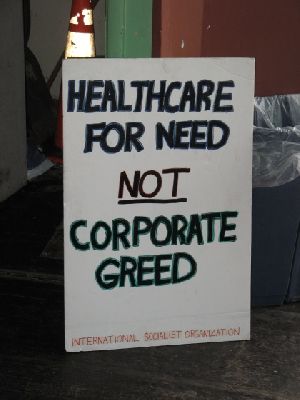Panelists Discuss Health Care
Primary tabs
July 23 2009 Health Care panel discussion Cafe Underground Railroad

On July 23, 2009 a panel discussion on Health Care Reform was held at the Underground Railroad Cafe. It was sponsored by the Interfaith Health Care Coalition, International Socialist Organization, Progressive Democrats of America and the group Rochester for HR 676. HR 676 is a bill in the US House of Representatives sponsored by John Conyers (D-Michigan) and co sponsored by our own Eric Massa (D-NY 29) which would expand Medicare to all citizens. Panelists were Dr Jim Gaden, a family practice physician, Melanie Funchess, a mental health advocate and Brian Erway, a medical technician and community organizer with 30 years experience in health care.

The United States is the only industrialized country that considers health care a commodity to be bought and sold, rather than a basic, inalienable human right. It is also the most expensive care in the world, costing over twice what citizens pay in the next highest countries such as Switzerland and France. For all this money we have the best health care in the world, right? Wrong, sort of. The top 10 percent of the population have the very best health care. According to a Kaiser study, 60 percent of health care spending goes to 10 percent of the population. Ninety-six percent of all health care spending goes to the top 50 percent of the population, leaving 4 percent for the rest of the country. Nearly 20 percent of Americans are uninsured and many more are underinsured. Statistics such as longevity and infant mortality rate the US at number 37 compared with the rest of the world. If the system was working, so many people would not be falling through the cracks. Our infant mortality rate rivals that of Haiti, the poorest nation in the Western Hemisphere.
How did our system become such a mess? Brian Erway explains. Thirty years ago health care was focused around the patient. About 20 years ago it started becoming commercialized. Health care recipients were no longer patients but “customers†and care became a “commodity†to buy, sell and trade. We spend more and get less. A Healthcare-Industrial Complex has evolved, much like the better-known Military-Industrial Complex. Sometimes the word “Congressional†is appended to both these names and appropriately so. Insurance, pharmaceutical and for-profit health care companies account for nearly half of all congressional campaign contributions. Democrats as well as Republicans get campaign dollars from these big businesses. Our health care dollars finance these campaigns. A third of what Americans spend on health insurance never goes to providing health care. The US spends $2 trillion a year on health care. $350 billion of that goes to executive compensation and salaries are rising. Much more goes to advertising and lobbying. They are using our money to make sure the system doesn't change.
Dr Jim Gaden spoke as a physician. “I started my family practice 17 years ago to help people and help them learn to improve the quality of their life.†“But then the rules changed.†It became all about money. “I spend more time every day arguing with insurance companies than I do seeing my patients.†After I examine someone and consider their symptoms, someone sitting behind a desk is determining what drugs I can prescribe, what tests I can order and what therapies are allowed. These people have not been to medical school, are not trained as diagnosticians. They are reading off of a computer screen. Critics of programs like HR 676 like to instill fear that some government bogeyman will get in between the doctor and patient. That bogeyman is already here, in the form of insurance company executives and claims adjusters. HR 676 and similar laws require that these decisions be made by doctors. It eliminates the bogeymen. Health care rationing is another fear they like to inflame. But we already have that as well. Health care is currently “rationed†to those who can pay, those who have the “right†jobs, and those who fill out all the paperwork correctly. Proposed solutions like HR 676 address who pays for health care, not who provides it. Most patients today have few choices under the current system. The employer chooses the plan, if any, and the plan determines which doctors the patient may see and what services may be provided. All of this in the name of “free choice.â€
Melanie Funchess, an activist and mental health advocate, describes the system as “broken all over.†“I've seen families have to give up custody of their children in order to get them health care.†Most of the attention on health care is focused on physical health. Mental health care is an unspoken shame. Many private insurance plans have eliminated coverage for mental health under the guise of saving money. Most mental health clinics operate at a deficit and have to be subsidized by the County, despite $60-70 copays. The number of visits are strictly limited as well. It may take 6 or 7 visits to a mental health professional just to make an accurate diagnosis. As a result, patients are rushed through the system and families cannot afford mental health services for their children. Often those children end up in the juvenile detention system at a cost of over $100,000 per year. Adults may end up in prison at similar cost to the public. All in the name of “saving money†(for the insurance companies).
The panel discussion was followed by questions and comments from the public. There were many statements of “We thought we had good insurance until we got sick.†People described having to spend their retirement savings or borrow against their 401k to pay for health care. People have to choose between paying for medications and paying for food. Why should anyone in one of the richest countries in the world be forced to make this choice? An interesting commentator was Mike King, who owned an insurance brokerage firm that handles health insurance for small businesses. “I am in favor of reform, and the reason is cost.†While he makes his living selling insurance, he sees that if the current system is not changed it will become unaffordable for everyone. Government statistics back him up. If the increases are not curtailed, by 2050 health care will consume 100% of our income. This of course is unsustainable.

How do we fix this mess? Universal single-payer such as that spelled out in HR 676 is the most rational approach. You get a Social Security card when you're born. You'll get a health care card. This is already how it's done in Canada and Europe. It will be costly, but we're already paying. We're just not getting it. There will also be tremendous savings. General Motors has to pay out so much in employee and retiree health care they are jokingly referred to as a health insurance company who makes cars. School districts could save the funds used for employee health care to buy more books and educate more children. State and local governments would not be burdened with unfunded Medicaid mandates. The Veterans Administration could focus on treating the most serious war injuries, not having to be bothered with routine health issues. The savings would easily cover the additional costs. Compared to the corporate bailouts of the past year, this would be the biggest of them all. Every business large and small, non-profit, sole proprietor and municipal would get a piece in the form of savings that would not have to be spent on increasingly-costly health insurance. This would truly be a stimulus.
How do we make this happen? The biggest and most difficult fix comes in the form of campaign finance reform. Officials do what they do because they need the money these companies have – money they took from us – to finance their election campaigns. Corporations are granted all the legal rights of an individual, like free speech, but none of the responsibilities, like being prosecuted when they commit crimes. What we refer to now as lobbying used to be known as corruption, bribery and graft. All are crimes.
The insurance and for-profit medical industry is going to use the money they took from us to block reform. We need to educate ourselves. We need to recognize lies and counter them with the truth. When they say rationing we need to remind everyone that it's already being rationed to the wealthy. We must not let those who are profiting from the current system be charged with reforming it. We must not let ourselves be taken in by false compromise that keeps the profiteers in power. A poor compromise bill is worse than no bill at all. Why do we want change? Because the current system is broken. Why do we want health care? Because it is our right!
For those interested in taking further action, Physicians for a National Healthcare Plan has more information. You do not have to be a physician to join.
There will be a bus to Washington DC on July 30 to “let our representatives, who are being lobbied every day, know what we want.†Tickets are $50 on a sliding scale. For more information









